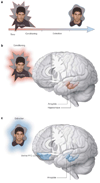Challenges in developing novel treatments for childhood disorders: lessons from research on anxiety
- PMID: 18754004
- PMCID: PMC2794358
- DOI: 10.1038/npp.2008.113
Challenges in developing novel treatments for childhood disorders: lessons from research on anxiety
Abstract
Alterations in brain development may contribute to chronic mental disorders. Novel treatments targeted toward the early-childhood manifestations of such chronic disorders may provide unique therapeutic opportunities. However, attempts to develop and deliver novel treatments face many challenges. Work on pediatric anxiety disorders illustrates both the inherent challenges as well as the unusual opportunities for therapeutic advances. The present review summarizes three aspects of translational research on pediatric anxiety disorders as the work informs efforts to develop novel interventions. First, the review summarizes data on developmental conceptualizations of anxiety from both basic neuroscience and clinical perspectives. This summary is integrated with a discussion of the two best-established treatments, cognitive behavioral therapy and selective serotonin reuptake inhibitors. Second, the review summarizes work on attention bias to threat, considering implications for both novel treatments and translational research on neural circuitry functional development. This illustrates the manner in which clinical findings inform basic systems neuroscience research. Finally, the review summarizes work in basic science on fear learning, as studied in fear conditioning, consolidation, and extinction paradigms. This summary ends by describing potential novel treatments, illustrating the manner in which basic neuroscience informs therapeutics.
Conflict of interest statement
DISCLOSURE/CONFLICT OF INTEREST
The author(s) declare that, except for income received from the primary employer, no financial support or compensation has been received from any individual or corporate entity over the past 3 years for research or professional service and there are no personal financial holdings that could be perceived as constituting a potential conflict of interest. Dr Pine has received compensation for activities related to teaching, editing, and clinical care that pose no conflicts of interest.
Figures




References
-
- Bar-Haim Y, Lamy D, Pergamin L, Bakermans-Kranenburg MJ, van IMH. Threat-related attentional bias in anxious and nonanxious individuals: a meta-analytic study. Psychol Bull. 2007;133:1–24. - PubMed
-
- Barrett PM, Duffy AL, Dadds MR, Rapee RM. Cognitive-behavioral treatment of anxiety disorders in children: long-term (6-year) follow-up. J Consult Clin Psychol. 2001;69:135–141. - PubMed
-
- Beck AT. Cognitive Therapy and the Emotional Disorders. New York: International Universities Press; 1976.
-
- Beesdo K, Bittner A, Pine DS, Stein MB, Hofler M, Lieb R, et al. Incidence of social anxiety disorder and the consistent risk for secondary depression in the first three decades of life. Arch Gen Psychiatry. 2007;64:903–912. - PubMed

